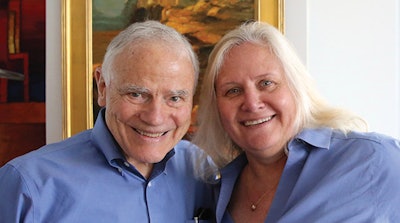
For most people, running a pioneering manufacturer of cartridge filter elements would take up all their time. For Christine Schaeffer, vice president of Meissner Mfg. Co., the parent company of Unicel, it's only part of her professional life.
Away from her responsibilities at the company, which was founded in 1956 by her father, Richard Meissner, Schaeffer is deeply involved in advancing the state of the healthcare industry. Her resume includes a long list of health-related philanthropic work and sponsorship; in 1995 she earned a doctorate in sociology from the University of Southern California, then in 2016 earned her Master of Public Health with an emphasis in biostatistics and epidemiology.
Her extensive education and interest in healthcare led her to get involved with Providence St. Joseph's Health in Southern California, where she has done data analysis and served on a few key committees.
"I've always been interested in data that helps us better understand why people get sick," she says. "The punch line is that we ultimately want well populations — not sick populations — but haven't moved the needle much in the right direction despite allocating so many dollars to healthcare."
Her work in the field took a major turn in 2016 when Providence St. Joseph became affiliated with the Institute for Systems Biology. In her role on the organization's board of directors, Schaeffer supports ISB's mission to revolutionize healthcare through a "systems" approach, which refers to the use of cutting-edge research to identify predispositions to diseases such as breast cancer, Alzheimer's, Lyme disease and many others.
RELATED: Arthritis Research Canada Celebrates Coast Spas Group's Don Elkington
"Our mission is take 'bench science' to the hospital bedside," she says. "There's amazing research being done that can be used to identify someone's predispositions, which can be very different from person to person. Our long-term goal is to turn the hospitals of the future into scientific wellness centers that are focused on prevention and highly individualized care."
The cross-disciplinary work at ISB includes exploring the relationship between genetics, proteins synthesis and metabolic products, and how they work together to impact susceptibility to disease. A clearer understanding of these factors may help researchers tailor preventive treatments to individual patients, and suggest highly targeted treatments for those who do get sick.
"The idea is to measure and see the cliff before you go over it," she says, "but with this type of science we also have the potential to bring you back. It's amazing work that points to a completely different way of thinking about disease prevention and treatment."
ISB's work concentrates on the "Four Ps" — predictive, preventive, personalized and participatory — and is about understanding how and why people get diseases. "With the data that ISB is generating, we can begin to create 'stories' that apply to the individual rather than making generalized assumptions about risks and what type of treatment works on a particular disease," she says. "We've learned that the one-size-fits-all approach to healthcare really doesn't work."
Schaeffer is busy but happily finds passion and time for both her day job and her side gig. "I was raised in this industry and very proud of our accomplishments over the years. But this work I do in my 'spare' time is fascinating and inspiring. I truly believe ISB is doing work that can make a tremendous difference in our lives."












































